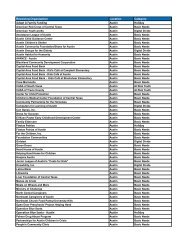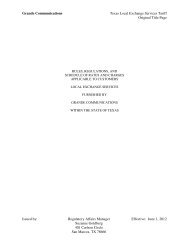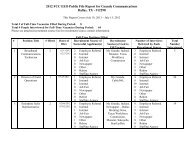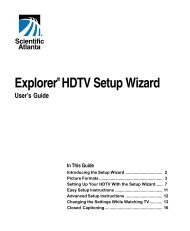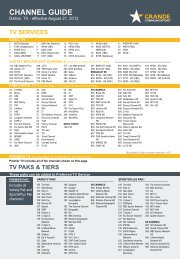Grande Communications Networks, Inc.
Grande Communications Networks, Inc.
Grande Communications Networks, Inc.
You also want an ePaper? Increase the reach of your titles
YUMPU automatically turns print PDFs into web optimized ePapers that Google loves.
<strong>Grande</strong> <strong>Communications</strong> <strong>Networks</strong>, <strong>Inc</strong>.<br />
F.C.C. Tariff No. 2<br />
Original Sheet No. 31<br />
2.9. Blocking of Access Traffic<br />
SECTION 2. RULES AND REGULATIONS (Cont’d)<br />
When a Carrier Customer terminates its access arrangements with the Company, it is mandatory<br />
that the Carrier Customer ensure that all End-User traffic – both originating and terminating –<br />
between the Carrier Customer and the Company is blocked. The Carrier Customer shall have the<br />
option of blocking the traffic itself, or arranging for the Company to block the traffic and paying<br />
all charges and related costs to compensate the Company for blocking the traffic. Where the<br />
Carrier Customer elects to block the access traffic itself, the Carrier Customer will have full<br />
responsibility to compensate the Company, at the Company’s then-currently tariff rates, for any<br />
End User traffic allowed to pass along the discontinued access service route.<br />
Where a Carrier Customer terminates its access arrangements with the Company, and the End<br />
User is a Shared Customer, the Carrier Customer also must adhere to the following requirements:<br />
2.9.1. Script Recordings<br />
The Carrier Customer must record a script to inform the Shared Customer that its<br />
interexchange service has been blocked at the request of the Carrier Customer. All<br />
recorded scripts must be submitted to the Company for prior approval. The script<br />
recording must state the following and there can be no deviation from or additions to this<br />
script:<br />
“Your access to [Carrier Customer’s] long distance services has been blocked by your<br />
long distance provider, [Carrier Customer], and not by your local service provider,<br />
<strong>Grande</strong> <strong>Communications</strong> <strong>Networks</strong>, <strong>Inc</strong>. Because [Carrier Customer] has chosen to<br />
block your access to its long distance services, you may no longer dial 1+ to use [Carrier<br />
Customer’s] long distance service. Instead, you must now either dial an access code to<br />
reach a long distance service provider of your choice to handle your long distance calls,<br />
or contact another long distance service provider of your choice to handle your long<br />
distance calling needs on a 1+ basis. For more information, please contact [Carrier<br />
Customer’s] customer service representatives at [Carrier Customer’s toll-free number].”<br />
Issued: May 21, 2001 Effective: May 22, 2001<br />
By:<br />
Kristene Stark<br />
Tariff Administrator<br />
401 Carlson Circle<br />
San Marcos, Texas 78666



